Email marketing can feel like a minefield for healthcare marketing professionals.
Bound by strict, non-negotiable rules (justifiably so), the domain of healthcare demands careful navigation — as the penalties for missteps can be too high of a price to pay.
If you’ve ventured into the world of healthcare email marketing, you’ve heard of HIPAA. These are the rules that stand guard to protect sensitive patient information from unauthorized access — and to impose steep legal penalties if they are found to be violated.
You can guess why HIPAA regulations matter when it comes to email marketing in healthcare. Patient information is valuable and must be handled with the utmost care. And there is no shortage of data security breaches when it’s not.
To put it into context, here are some statistics on healthcare data breaches that happened in the United States:
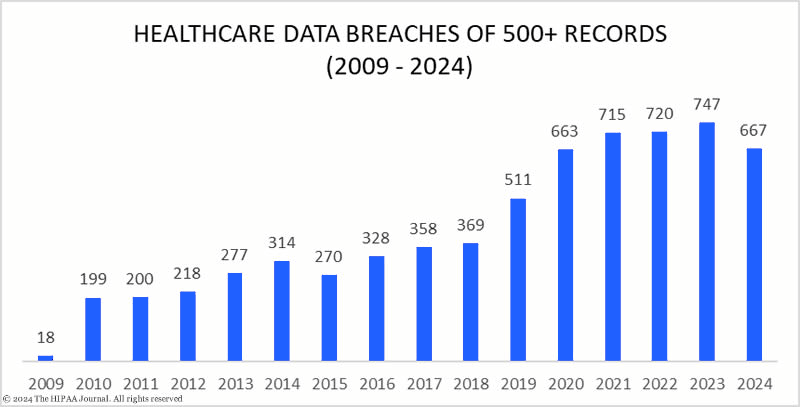
Healthcare Data Breach Statistics (2009 – 2024)
These numbers are alarming — not simply because a breach is a technical failure, but also because it’s a breach of trust. Patient data, once compromised, can have far-reaching consequences not just for the individuals affected but for the integrity of the healthcare system itself.
But, while HIPAA serves to protect this trust, its rigid rules often create friction with the need for creative, engaging healthcare marketing strategies. Given this, how can healthcare professionals effectively connect with their patient base while staying firmly on the right side of HIPAA?
Let’s find out.
What is HIPAA, and Why Should it Matter When Marketing?
The Health Insurance Portability and Accountability Act or HIPAA is a federal legislation issued in 1996 by the United States of America, primarily to protect and secure patient information.
As a healthcare provider, even if you aren’t sending marketing emails, you would still send transactional and informational emails to patients. HIPAA marketing rules are guidelines for what goes in and what shouldn’t for all such emails.
HIPAA is divided into several categories – there’s a Privacy Rule, a Security Rule, the Enforcement Rule, Breach Notification Rule and so on. Notably, most companies attract their troubles by violating the minimum necessary rule, which falls under the Privacy Rule.
Under the minimum necessary rule, employees should work with the least amount of personal health information (PHI) to complete a task. Collect any more PHI than is needed and it starts violating the regulations.
What constitutes Personal Health Information (PHI)?
It’s mostly basic information about patients such as:
- Name
- Contact information
- Social security number
- Medical information
- Financial information
- Facial information
Complying with HIPAA means you do everything necessary to ensure that personal health information (PHI) of patients and other sensitive data is protected at all costs.
The idea is to prevent information from falling into the hands of unauthorized people who could mishandle medical data. So, HIPAA compliance is necessary for both the healthcare providers and their business associates who would provide administrative, tech, or healthcare marketing services.
Why the strict regulations?
The simple answer is that data breaches are on the rise.
Healthcare data breaches have skyrocketed every year since the records began in 2009. In 2010, close to 6 million people were victims of data breaches in the country. In 2021, the number was over 50 million, affecting numerous healthcare companies and their benefactors!
Surprisingly, 73.2% of the breaches involve healthcare providers, and hacking is deemed the biggest threat to healthcare data.
Also, despite advancements in data security, the year 2024 still tops the list of biggest data breaches of all time:
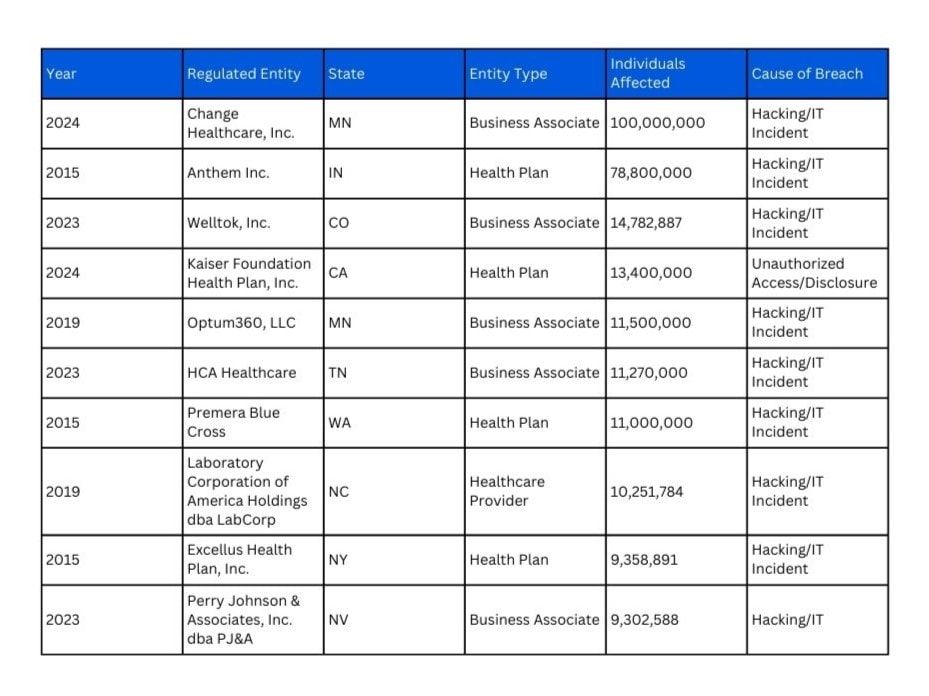
The Biggest Healthcare Data Breaches of 2024
So, as a healthcare provider or a marketer functioning in the industry, it is in your best interest to ensure HIPAA compliance for two reasons:
1. Everybody has a basic right to privacy
Your clients trust you with their personal data, so you have an obligation to maintain their privacy.
When you send an email to your patient, there are four points of contact through which the information goes through. On your end, it is the email software and transmission and on their end it’s the reception of the mail and its storage.
While HIPAA doesn’t hold you accountable for what happens on the recipient’s side, you need to ensure protection for information on your side. Human error is quite often the biggest contributor to HIPAA violations — such as sending an email with PHI to the wrong address.
However, HIPAA-compliant marketing automation tools can eliminate such errors and ensure patient data security – especially since medical data is a magnet for identity thieves.
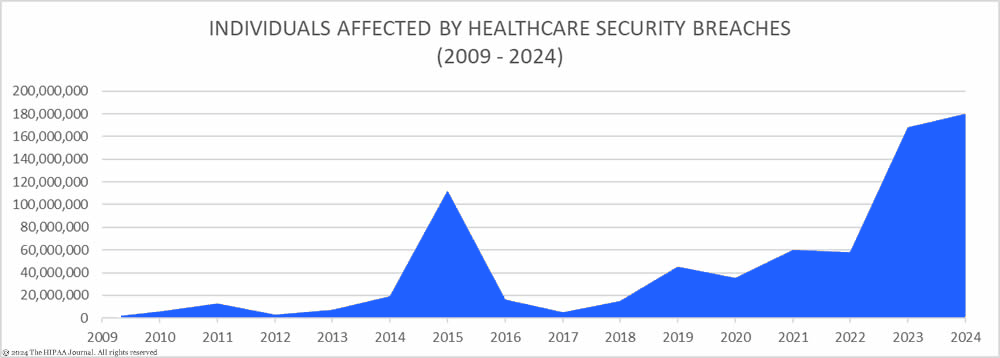
Individuals affected by healthcare security breaches
2. You would want to avoid fines
Exposing personal information of patients even inadvertently can lead to hefty fines — more so if it’s determined that the breach could have been prevented from happening with a little more vigilance.
The fine for violations can range from $141 to $70,000 based on the severity or more than $2 million depending on the scale. If you’re still not convinced, check out this directory of big HIPAA fines listed by year.

Penalties levied for HIPAA violation
HIPAA’s Stance On Email Marketing
Before delving into HIPAA compliant email marketing, it’s essential to understand how HIPAA uses the term “marketing”.
HIPAA’s Privacy Rule defines the term “marketing” as making “a communication about a product or service that encourages recipients of the communication to purchase or use the product or service.”
It further goes on to clarify that the communication can only be considered as marketing if the sender has authorization from the individual.
Here are a few examples of marketing communications that require prior authorization from the patient/client:
- A hospital sending an email to a former patient about a new cardiac facility that is not part of the hospital. Since the communication is not meant as treatment advice but marketing, the hospital must have the patient’s consent before sending such messages.
- A health insurer communicating insurance products or promoting other services based on the patient’s history.
- A glucose monitor company sending brochures to members of a health plan list after purchasing the list.
- A healthcare provider selling a list of patients to a drug manufacturer, who offers discounted medications directly to the patients.
And here’s a list of communication that HIPAA doesn’t consider as marketing and, therefore, doesn’t require prior authorization:
- The communication made about treatment.
- A healthcare provider sharing information about a new product or service they are offering.
- A physician recommending patients alternate treatments or providers to manage or care for their health condition.
How can healthcare organizations mess up their communication or get it right?
Here’s an example:
A healthcare provider communicates with a patient by sending a non-HIPAA-compliant text. It could be something like, “Dear Mr. Johnson, this is a friendly reminder that you have a 4 o’clock meeting today with the oncologist to discuss your cancer treatment plan.”
Maybe Mr. Johnson hadn’t revealed his condition to his family or colleagues, and they were right beside him when he opened the message. The SMS could also be intercepted by other applications or someone else thus revealing his condition.
A more discreet HIPAAcompliant communication would be “Dear Mr. Johnson, this is a friendly reminder that you have a 4 o’ clock appointment today at the Sunshine Clinic”.
The same healthcare provider can use a HIPAA compliant email marketing template such as this one:
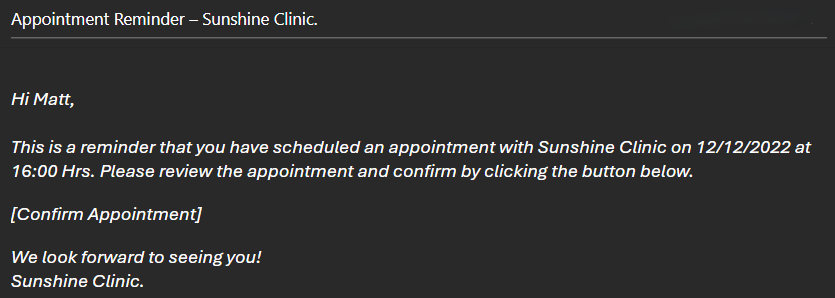
More Healthcare Email Templates You Could Use
How To Send HIPAA-Compliant Marketing Emails
To ensure your emails fall within HIPAA marketing guidelines, there are a few basic steps you can take:
1. Ensure your patients consent to receiving marketing emails
As we saw earlier, you cannot send patients marketing emails without their consent. Here’s what you can do:
- Let people know clearly that they are opting into your email marketing list by signing up and providing their contact information.
- Remind them of the benefits of subscribing to your emails — be it discount coupons, promotional gifts, refill reminders, or ease of care coordination.
- They should also know how often they can expect to receive emails and that they can opt-out anytime.
2. Pick a reliable HIPAA-compliant email marketing platform
The standard marketing platforms won’t cut it for healthcare organizations. Instead, what is needed is a HIPAA-compliant email marketing tool that can send direct encrypted emails to patients.
LeadSquared’s healthcare CRM, for instance, is fully HIPAA compliant and ensures PHI security. The automation brought about by the CRM captures patient inquiries, responds to queries faster and sends review requests that are all secure.
3. Avoid sending hyper-personalized emails
Personalization, one of the best practices of email marketing, can quickly become your enemy when overdone, especially in the healthcare sector.
Information that can identify patients, such as their treatment preference, location, contact information, or choice of drugs, is regarded as protected health information (PHI). When dealing with these attributes, one must know they can’t be used anywhere but as data for inference. So, personalization should always happen within the confines of HIPAA restrictions.
Here’s a simple table differentiating what can and cannot be included in HIPAA-compliant email messages:
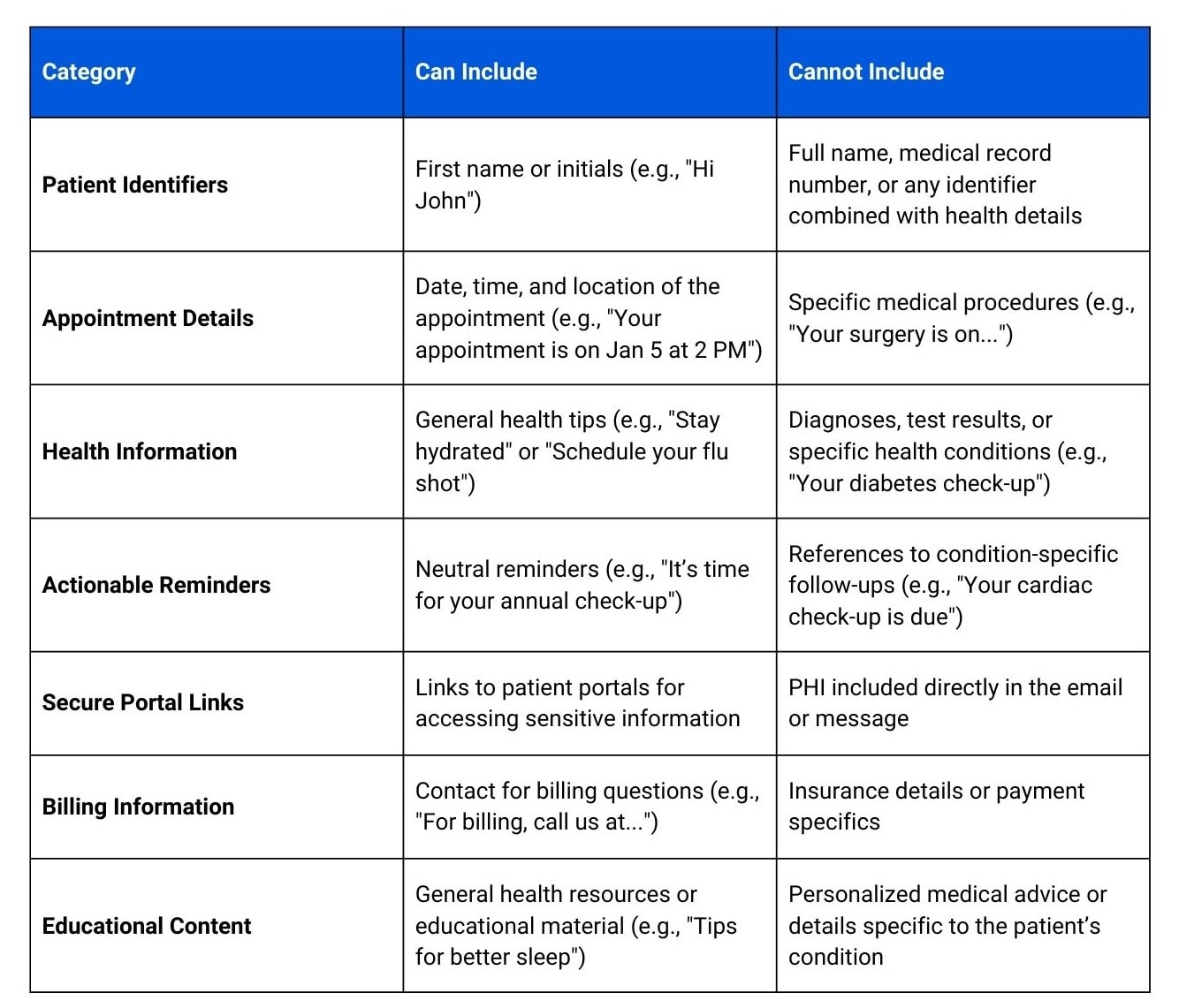
Choosing HIPAA-compliant Marketing Automation Tools
As a healthcare service provider or marketer, you are bound by regulations to achieve HIPAA compliance.
It is possible to send general emails that do not fall under HIPAA’s restrictions with a regular marketing service. However, when your communication involves electronic protected health information (ePHI), a HIPAA-compliant email marketing software or service provider becomes a must-have.
So how do you pick a service or tool that is HIPAA-compliant?
Here are some pointers to note:
Mention of HIPAA certification
The simplest way to figure out if the marketing platform is right for you is to know if they mention anything about being a HIPAA-compliant email platform on their website. To abide by the regulations, the platform needs to update its technology, and many simply lack the expertise or the desire to invest in it.
So, unless they offer HIPAA compliance, they won’t mention it.
The Business Associate Agreement
A Business Associate Agreement (BAA) is a legally binding contract designed to protect personal health information (PHI). A marketing platform that is HIPAA compliant will sign business associate agreements (BAAs) with you. The BAA solidifies their responsibility to protect the ePHI.
However, there are companies that have limited functionality because of their restrictive BAAs. Therefore, it’s important to read the fine print to understand their limitations.
Data encryption
End-to-end data encryption is essential to keep your data safe while it is at rest (stored data at the source) or in transit (while being sent). So, when picking a platform, ensure it offers a HIPAA compliant email solution with robust encryption for both stored and transmitted data. You need to pay special attention to encryption of outbound emails — since data that is in transit is highly susceptible to attacks.
The Best HIPAA-Compliant Healthcare CRM for Your Organization
Rated as the best by CRM.org, LeadSquared serves the needs of many leading healthcare organizations as a HIPAA-compliant Email Marketing Platform. Being fully HIPAA-compliant, it maintains robust PHI security and enables secure omnichannel communication with your patients.
As one of the leading HIPAA-compliant healthcare technology solutions, it allows you more than mere email marketing. With LeadSquared, you can also:
- Automate your patient intake process with HIPAA-compliant intake forms
- Capture patient inquiries from different channels such as search engines, social media, and referrals.
- Enable digital appointment scheduling, as well as patient onboarding with portals.
- Communicate securely through other channels such as email, WhatsApp, text messages, and phone calls.
- Automate waiting lists and reschedule instantly.
- Seamlessly integrate with your other tools such as EHR/EMR systems.
- Automate patient referral management.[MJ1]
How do we know LeadSquared is one of the best HIPAA-compliant platforms? Our clients say so. 😊
Here is what Tandem Care, a U.S based home care service provider, has to say about how they were able to double the number of patient inquiries with LeadSquared!

Despite having prior experience using popular tools like Salesforce, HubSpot, Zoho, and more… Tandem still lauds LeadSquared as the best platform they’ve ever come across.
Let’s hear it from their Chief Operating Officer herself:
To Conclude
HIPAA exists primarily for the protection of the patient’s information. In today’s digital age, people are rightly apprehensive about the security of their personal information, and hackers are on the prowl for weaknesses in the system. To successfully run a HIPAA-compliant email marketing campaign, you will need:
- The consent of your patients for the use of their PHI
- HIPAA compliant email marketing strategy and implementation tool
- To avoid hyper-personalization in the marketing emails
- To make the opting-out process clear
Book a Demo today to learn how you can send just the right marketing emails to your client base — or better still, personalize their mails using our HIPAA-compliant email marketing platform!
FAQs
1. What makes LeadSquared’s email marketing platform HIPAA-compliant?
We ensure compliance by implementing robust safeguards to protect Protected Health Information (PHI). These include encryption for all data transmissions, secure storage solutions, and rigorous access controls to prevent unauthorized access. Our platform is built with healthcare organizations in mind, adhering to HIPAA’s Privacy and Security Rules.
2. Can I include patient information in my email campaigns?
Yes, but it’s crucial to follow best practices for PHI. LeadSquared enables you to segment and personalize emails while protecting sensitive data. Our platform encrypts PHI during transmission and at rest, ensuring it is never exposed to unauthorized parties. We also offer templates and workflows designed to help you craft compliant messages without inadvertently including sensitive data.
3. How does LeadSquared ensure email data remains secure?
We use industry-leading security protocols, including end-to-end encryption, secure sockets layer (SSL) for data transmission, and robust access control measures. Our systems are regularly audited, and we follow strict internal processes to identify and mitigate potential vulnerabilities. Your data is safe with us—always.
4. Can I automate email campaigns while staying HIPAA-compliant?
Absolutely! Our automation features are specifically designed with HIPAA compliance in mind. You can create workflows for appointment reminders, patient follow-ups, or educational campaigns, all while ensuring that PHI is handled securely. LeadSquared’s email marketing software helps you stay compliant by controlling who can access and use patient data throughout the automation process.
5. Does LeadSquared provide guidance on crafting HIPAA-compliant emails?
Yes, we do! Our platform includes HIPAA-compliant templates and provides guidance on what should and shouldn’t be included in your messages.
6. How do I sign a Business Associate Agreement (BAA) with LeadSquared?
Signing a BAA with us is simple. Once you decide to use LeadSquared as your email marketing platform, our team will work with you to draft and sign the agreement. This document formalizes our responsibility to protect PHI and outlines the measures we take to ensure compliance.
7. Can I track email engagement metrics while staying compliant?
Yes! LeadSquared provides detailed analytics on open rates, click-through rates, and engagement without compromising compliance. We anonymize and aggregate data to ensure no PHI is exposed while still providing actionable insights for improving your campaigns.
8. What happens if there’s a data breach?
While we take extensive measures to prevent breaches, in the rare event one occurs, we have a robust incident response plan. We will notify you promptly and work with you to mitigate any risks. Additionally, our systems are designed to minimize exposure by encrypting all sensitive data and limiting access to authorized personnel only.
9. Can I create multi-channel campaigns with email and SMS?
Yes, LeadSquared supports multi-channel campaigns that combine email, SMS, and other communication methods. This is especially useful for healthcare providers who want to ensure important messages, such as appointment reminders, reach patients promptly.
10. Does LeadSquared integrate with electronic health record (EHR) systems?
Yes, LeadSquared integrates seamlessly with many popular EHR systems, ensuring a smooth data flow between your patient records and marketing campaigns. This integration helps you automate communication while maintaining a consistent, secure experience for your patients.
11. How can LeadSquared help my practice stand out?
By combining compliance with advanced marketing features, LeadSquared helps your healthcare organization build trust with your patients while maximizing outreach. Our segmentation, automation, and analytics tools enable you to deliver targeted, engaging, and timely communications that foster stronger patient relationships.
12. What training and support does LeadSquared provide?
We’re here every step of the way! Our onboarding team will guide you through setup, HIPAA compliance best practices, and how to use the platform effectively. Plus, our support team is always available to answer questions or troubleshoot issues.
13. How much does it cost to use LeadSquared for HIPAA-compliant email marketing?
We offer flexible pricing plans tailored to your healthcare organization’s size and needs. Whether you’re running campaigns for a small practice or a large healthcare system, we can customize a solution that fits your budget while delivering the features you need.
14. What kind of healthcare organizations could use your HIPAA compliant marketing platform?
Our platform is trusted by a wide range of healthcare providers, including private practices, large hospitals, outpatient clinics, and even wellness centers. Any organization needing HIPAA-compliant email communication can benefit from LeadSquared.









